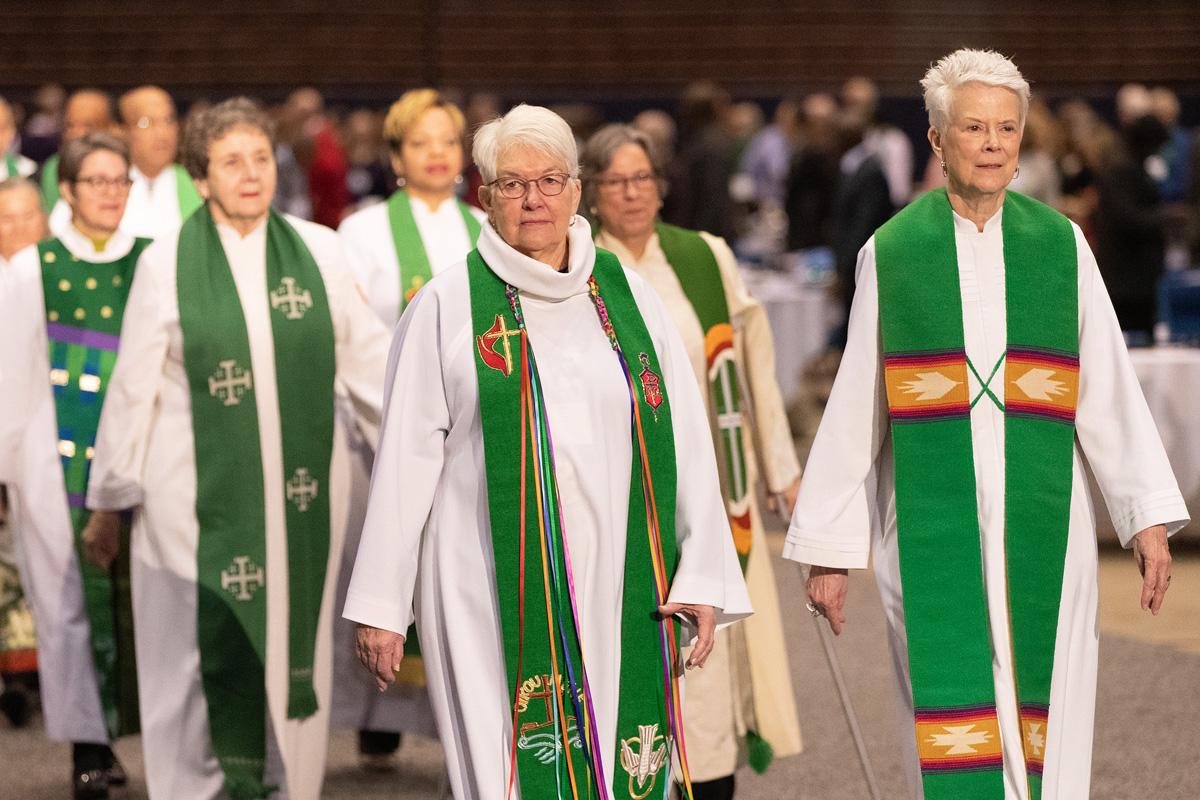The United Methodist Church’s top court has set Jan. 1, 2023, as the date when U.S. bishops facing mandatory retirement must step down and their newly elected successors take office.
That means new bishops will be able to begin their assignments in the usual timespan of nearly two months after U.S. jurisdictional conferences. The Council of Bishops has scheduled the regional meetings that elect bishops for Nov. 2-5 this year.
The Judicial Council spelled out its reasons for setting Jan. 1 as the changeover date in Memorandum 1446, which modifies an earlier decision that allows U.S. jurisdictional conferences to go forward this year.
In the memorandum released June 1, the church court reiterated its ruling that the Council of Bishops has the authority to call the regional meetings “for the limited purpose” of continuing “episcopacy in The United Methodist Church” as required by the denomination’s constitution.
However, the new memorandum revisits the church court’s earlier stance in Decision 1445 that the new U.S. bishops officially must assume office on Sept. 1.
The Book of Discipline, the denomination’s policy book, says U.S. bishops are to retire Aug. 31 after regular jurisdictional conferences and new bishops begin their assignments Sept. 1.
But Memorandum 1446 says the denomination’s current unprecedented situation puts those disciplinary provisions on a collision course with the denomination’s constitution.
What about central conferences?
In this case, the church court said, the dates in the Discipline “cannot be applied without disrupting the constitutionally mandated episcopal supervision for the Church.”
To harmonize constitutional and disciplinary requirements and meet the denomination’s needs, the church court held: “January 1, 2023 shall be the effective date of: (1) assignment for all bishops, newly elected bishops and active bishops already serving in the jurisdictions, and (2) mandatory retirement for bishops whose sixty-eighth birthday has been reached on or before July 1, 2020.”
That means the ruling affects only bishops who planned to retire in 2020, not those who turned 68 afterward and expected to serve until 2024.
Memorandum 1446 goes on to say that jurisdictional conferences may proceed with their usual business of the election, consecration, assignment and retirement of bishops, as dictated by the Discipline.
Usually, jurisdictional conferences meet to elect bishops in mid-July every four years following General Conference, the denomination’s international lawmaking assembly. However, the pandemic now has led to three postponements of General Conference, originally set for May 2020 and now scheduled for 2024.
When it enacted the dates for bishops’ moves, the church court said, “the General Conference neither anticipated nor made provision for a global pandemic and continuing conference delays.”
Last year, 11 U.S. bishops who initially postponed their retirements after General Conference’s first delay stepped down because they were taking on new roles with the Council of Bishops or they were exceeding the denomination’s mandated retirement age for bishops.
To continue episcopal coverage, 14 U.S. bishops have since taken on expanded assignments. Five U.S. bishops who planned to retire also agreed to stay on.
The Judicial Council and the Council of Bishops agree the situation is unsustainable.
How many new bishops can jurisdictional conferences elect? Both Decision 1445 and Memorandum 1446 said the formula and number of bishops for each jurisdiction approved by the 2016 General Conference is still legally binding. That means the jurisdictional conferences likely will have a total of 16 vacancies to fill when they meet.
The United Methodist Church has five jurisdictions — each encompassing multiple episcopal areas in a geographical region of the United States. Since they only involve people in the United States, jurisdictional conferences face fewer logistical hurdles than General Conference, which draws delegates from four continents and 16 time zones.
But like General Conference, half of the delegates to jurisdictional conferences are lay and half are clergy. Most of the delegates to the coming jurisdictional conferences were elected in 2018 and 2019.
The Judicial Council released Memorandum 1446 just days after the Council of Bishops officially set Nov. 2-5 for jurisdictional conferences. The memorandum responded to the bishops’ request for clarification about what the church court’s earlier Decision 1445 means for bishops’ retirements and assignments.
The new memorandum basically adopted the argument made in a separate opinion by Judicial Council member Beth Capen. She concurred that jurisdictional conferences should be held this year but dissented that newly elected bishops must assume office on Sept. 1 “because it serves no purpose in these circumstances.”
Hahn is assistant news editor for UM News. Contact her at (615) 742-5470 or [email protected]. To read more United Methodist news, subscribe to the free Daily or Friday Digests.




